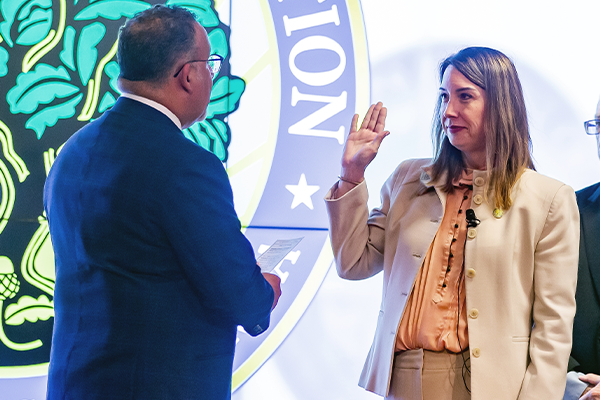Former USU Graduate Student in Special Education and Rehabilitation Services Glenna Wright-Gallo Appointed to U. S. Department of Education

Glenna Wright-Gallo was confirmed as OSERS assistant secretary by the U.S. Senate on May 10, 2023.
Utah State University alumna Glenna Wright-Gallo is a force to be reckoned with when it comes to being an advocate in special education for children and youth with disabilities. In May, Wright-Gallo was appointed to the U.S. Department of Education as the assistant secretary for the Office of Special Education and Rehabilitation Services (OSERS). She has spent more than 25 years championing for special education programs that support students with disabilities.
Early in her career, Wright-Gallo was a special education teacher and administrator before serving as the Utah State Board of Education’s state director of special education. In this role, she was passionate about improving outcomes for students who fall under the Individuals with Disabilities Education Act, a law that makes public education and special education services available to children with disabilities throughout the nation. More recently, Wright-Gallo served as Washington State’s assistant superintendent of special education in the Office of Superintendent of Public Instruction.
“I have a strong sense of justice, an internal sense of equity to identify with a group of students who tend to be furthest from educational equity, those who sometimes have arbitrary limitations placed on them,” said Wright-Gallo. “In my junior year of high school, I was identified with a speech-language impairment. As a young adult, I was identified with a hearing impairment. However, I never had limitations placed on me. I feel strongly this is an opportunity that all students deserve and should have access to.”
Wright-Gallo knew from a young age that she would be a teacher. While she was getting her bachelor’s degree, she took a special education class and said it felt like “home.” After graduation, she started teaching and while teaching decided to pursue a graduate degree in special education and rehabilitation services from USU.
On her first day in the graduate program, Wright-Gallo recalls being nervous for her first course in instructional design but grateful that she could apply what she was learning in her graduate program in the classroom. This experience gave Wright-Gallo the opportunity to experiment with new thought processes and ways of learning, and then to immediately apply these principles with her students.

Glenna Wright-Gallo
“We have to be continuous learners. The status quo is never adequate for me,” Wright-Gallo said. “I always want to be learning about something else and expanding my knowledge base. The USU master’s program presented me with the opportunity to think about things in a different way, thinking about them critically, looking at data, looking at research, and then asking hard questions to get to the root cause behind the system that we are faced with now.”
Tom Higbee, professor and department head of Special Education and Rehabilitation Counseling at USU, taught one of Wright-Gallo’s graduate courses and later was the chair for her master’s thesis. “She was able to run her thesis project, which ended up being published in a respected academic journal, while simultaneously teaching full-time in a special education classroom and raising her family,” said Higbee. He also noted that Wright-Gallo has an ability to tackle multiple challenges simultaneously and analytically, whether in the classroom or in one of the multiple high-level leadership positions she has held in her career. “Everywhere she goes, things get better,” continued Higbee. “That is a testament to her leadership abilities and dedication to her field.”
When asked about the challenges that are facing special education teachers, Wright-Gallo said that she feels that academic pathways need to be continually elevated, with greater opportunities to attend college and move into careers, not fewer. According to Gallo, school systems sometimes focus on reaching the minimal level of compliance instead of truly improving education, employment, and career outcomes for children with disabilities.
One of Wright-Gallo’s goals is to make sure that every child with a disability has access to effective instruction, intervention, special education, and related services. She is adamant about raising education expectations for children, students, and youth with disabilities, and is looking at educators with disabilities as positive role models to demonstrate what is possible. Wright-Gallo has observed that educators and families are incredibly passionate about the needs of children and individuals with disabilities, leading to a strong coalition of support for her goals.
“We need for things to be different in a more effective manner to improve outcomes. I want to be known for not admiring the system we have now, but for using the resources, data, and information that we have from families and individual with disabilities to improve the system on a continuous basis,” concluded Wright-Gallo. “As a parent, as an educator, and as a person with a disability, I want the system to improve and see more demonstrated improved outcomes—whether it’s more access and success in secondary education, competitive integrated employment and career opportunities—all of these things together is what we need to move forward as a nation.”

